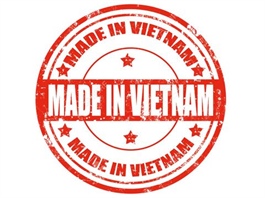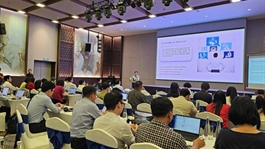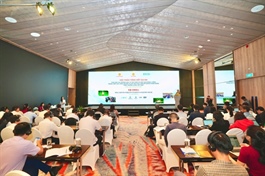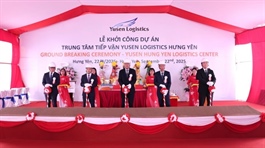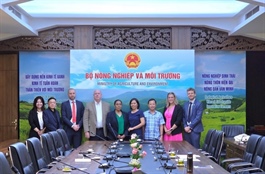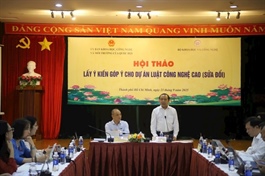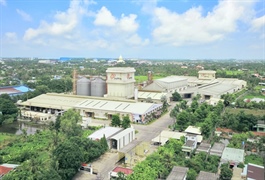Việt Nam aims for top 30 in Global Innovation Index
Việt Nam aims for top 30 in Global Innovation Index
Innovation must bring science and technology to bear on solving the country’s practical challenges, nurturing a spirit of creativity across society and making it a lifestyle and a mindset for every citizen and organisation.
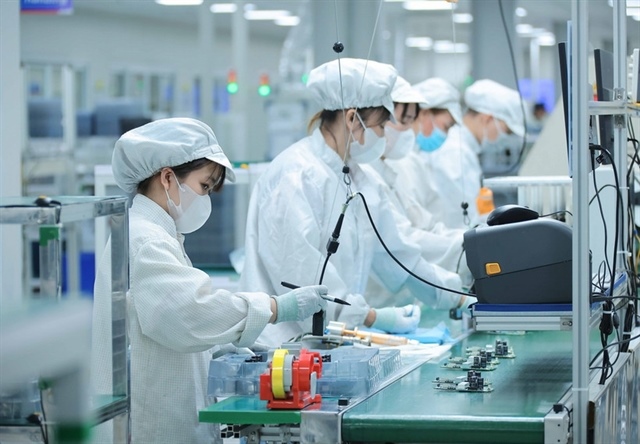
Workers at a high-tech industrial park in Bắc Ninh Province. — VNA/VNS Photo Hoàng Hiếu |
Việt Nam has set its sights on ranking among the world’s top 30 in innovation within the next five to 10 years, according to Minister of Science and Technology Nguyễn Mạnh Hùng.
The minister revealed the goal at a workshop held in Hà Nội on Thursday that was organised in collaboration with the World Intellectual Property Organization (WIPO) to present the country's Global Innovation Index (GII) 2025 results.
To achieve this ambitious target, the country will need to focus on four strategic pillars, while also relying on support from the WIPO and the concerted engagement of ministries, localities, businesses and society at large.
The event provided the latest insights from the GII 2025 report along with methodological adjustments, the significance of the index, global innovation trends and Việt Nam’s future prospects.
In his opening remarks, Hùng said that “innovation in Việt Nam must be innovation for the whole population.”
He underlined that innovation must bring science and technology to bear on solving the country’s practical challenges, nurturing a spirit of creativity across society and making it a lifestyle and a mindset for every citizen and organisation. This, he said, would help shape a start-up nation built on digital technology.
The minister noted that the GII is a comprehensive measure of innovation, serving as a valuable reference for Việt Nam to improve its capacity. Interpreting and analysing each indicator would provide a clear basis for the country to enhance its performance and directly contribute to sustainable development goals, he added.
WIPO was also asked to implement a support programme to help Việt Nam improve its GII ranking to within the global top 30 within the next five to 10 years.
“This is a highly challenging goal requiring the concerted efforts of the entire political system, the science and technology community and the business sector,” he acknowledged.
“We very much hope for the close companionship and direct support of WIPO and its Director General. The Ministry of Science and Technology will serve as a key partner for effective cooperation to make this vision a reality," Hùng stressed.
To further strengthen Việt Nam’s standing in the GII, Hùng outlined four priority areas.
Improving the institutional and regulatory environment for innovation is the first major task. Việt Nam must remove legal and financial barriers, modernise intellectual property frameworks and encourage businesses to invest boldly in R&D and new technologies.
By the end of this year, three important laws – on intellectual property, technology transfer and high technology – will be revised to recognise research results as assets. These may then be traded, evaluated, included in financial statements or used as collateral and capital contributions.
Second, more investment is needed in scientific, technological, innovative and digital infrastructure. Việt Nam will develop modern research centres, advanced laboratories, supercomputing facilities and national open data systems to provide the essential foundations for breakthrough innovation.
Developing a skilled workforce is another main priority. Policies will focus on reforming STEM education and fostering closer links between universities, research institutes and businesses, while also attracting and nurturing talent from both within and outside the country.
Finally, promoting innovation within enterprises will be required. Businesses must be at the heart of the innovation ecosystem. The State will support them through funding programmes, venture capital funds, research commissioning mechanisms and priority public procurement of new products.
WIPO Director General Daren Tang praised Việt Nam’s strong progress, noting that the country has set itself ambitious goals to become an upper middle-income industrial nation by 2030 and a high-income economy by 2045.
Innovation and intellectual property, guided by Resolution 57, will be the key drivers in making science, technology and creativity the central engines of development, he said.
According to the GII 2025 report, Việt Nam ranks 44th out of 139 economies worldwide, second among 37 lower middle-income countries and ninth in Southeast Asia, East Asia and Oceania. Notably, Việt Nam has consistently outperformed its income group for over a decade.
A crucial factor underpinning Việt Nam’s sustained performance has been its governance approach. Since 2017, the Government has treated the GII as a management tool, continually introducing measures to improve each indicator. Việt Nam has also localised the GII into a Provincial Innovation Index, enabling provinces to self-assess and compete constructively, while aligning intellectual property policies closely with innovation.
At the workshop, WIPO expert Sacha Wunsch-Vincent offered recommendations for Việt Nam to climb further in the GII. He suggested investing more effectively in R&D, strengthening science and industry links, moving from assembly to proactive production, building a vibrant start-up and growth finance ecosystem and managing intangible assets strategically to attract value.
Experts agreed that innovation does not arise spontaneously, but must be deliberately built through institutions, infrastructure, talent, enterprises and coherent policies.
Việt Nam, they concluded, is now well positioned, with strong political will, support from the scientific and business communities and backing from international partners like WIPO.
- 16:03 25/09/2025







